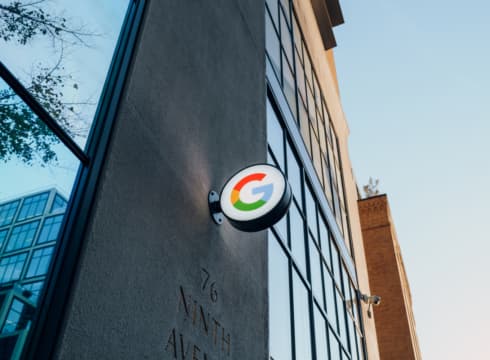Google has imposed unfair market conditions on OEMs by bundling all 11 apps together, and forcing OEMs to pre-install them, said CCI
The competition watchdog argued that competitors of Google such as Fire OS have become extinct owing to former’s anti-competitive stance
The tribunal will continue hearing the case on March 15, with ASG Venkatraman continuing his submission in the matter
Inc42 Daily Brief
Stay Ahead With Daily News & Analysis on India’s Tech & Startup Economy
The Competition Commission of India (CCI) on Tuesday (March 14) told the National Company Law Appellate Tribunal (NCLAT) that the Mobile Application Development Agreement (MADA) is one of Google’s tools to enforce its anti-competitive policies.
MADA mandates that OEMs should pre-install the entire Google Mobile Services suite, and not individual apps.
Adding further to this, the CCI said that there was no technical requirement for smartphone manufacturers to pre-install the entire suite. He added that Google imposed unfair market conditions by bundling all 11 apps together, and forcing OEMs to pre-install them. Terming this Google’s ‘Take it or Leave it’ policy, Venkatraman said that the option before smartphone makers is to take all 11 apps or choose commercial failure.
Lashing out at Google, Additional Solicitor General N Venkataraman, representing CCI, noted that the tech giant ought to have acted responsibly, as a market leader, to ensure there is healthy competition in the space.
He also alleged that Google used its dominance in the Android OS market to further dominate other markets as well. Venkatraman further alleged that the big tech giant indulged in unfair trade practices to generate revenue, specifically in the apps and OS space.
Play Store Policies Under Fire
Training his guns at the US-based major, the ASG argued that Google bars the entry of certain apps on its Play Store, while enjoying the right to feature its apps on other app marketplaces. This, he said, was done to enjoy ‘an edge’ over other players that offered apps with similar functionalities.
In its submissions, Venkatraman also said that Google discouraged users from sideloading apps, outside of the Play Store, through a series of warnings.
“Sideloading of apps is a multistage process, which every user cannot possibly perform and this [cumbersome process] cannot be an antidote to the competitive abuse indulged by Google,” the ASG was quoted as saying by The Hindu BusinessLine.
Sideloading allows users to download apps from external sources, without using Google’s in-house app marketplace. CCI, in its antitrust ruling last year, had claimed that Google perpetuates its dominance in the field by making the process of sideloading tedious and full of warning for users. The competition watchdog wants this process to be minimal and smooth to curb the dominance of these players.
While noting that Google’s market share in the India Android devices rose from 35.4% in 2011 to 98.47% in 2018, the ASG argued that the shift spelled the demise of many of its competitors in the app marketplace space.
“The competitors of Google such as Fire OS have become extinct,” he added.
He said that the Google Play Store had more than 28.7 Lakh apps on its platform compared with ‘insignificant’ numbers on its competitor app marketplaces. The ASG also noted that it was important for OEMs to have Play Store to be ‘successful’, adding that Google abused its dominance in the field by tying Google search to its app store.
Through his ‘tying exercise’, Venkatraman argued that Google generates more data and traffic, which is then subsequently used to rake up more revenue. Quoting data, the ASG said that when pre-installation was not deployed on Microsoft mobile devices, Google’s usage ‘drastically’ came down.
“… Google also ties Youtube with (the) Play Store, which kills the competition in the market. Youtube has a market share of 99.5% and all other competitors constitute less than half a percent. Google, through Youtube, has monetized INR 825 Cr in 2018 alone, against INR 97.83 Cr in 2013,” added ASG Venkatraman.
This comes a day after the competition watchdog told NCLAT that OEMs that did not sign Google’s agreements and created their version of Android went extinct.
At the centre of the case is the antitrust ruling passed by the CCI last year which accused the tech major of abusing its market dominance in the Android devices market and with regards to its Play Store policies. The competition watchdog, subsequently, imposed two hefty penalties, totalling INR 2,274 Cr, on the market giant and directed Google to undertake sweeping changes to its operations in the country.
Afterwards, Google approached the NCLAT seeking to quash the order, which was rejected by the tribunal. The tech major then approached the Supreme Court to intervene in the matter and grant interim relief to the company, which was again rejected by the Apex Court. The case is now pending before the NCLAT which is now hearing the matter.
The tribunal will continue hearing the case on Wednesday (March 15) as well, with ASG Venkatraman continuing his submission in the matter.
{{#name}}{{name}}{{/name}}{{^name}}-{{/name}}
{{#description}}{{description}}...{{/description}}{{^description}}-{{/description}}
Note: We at Inc42 take our ethics very seriously. More information about it can be found here.


